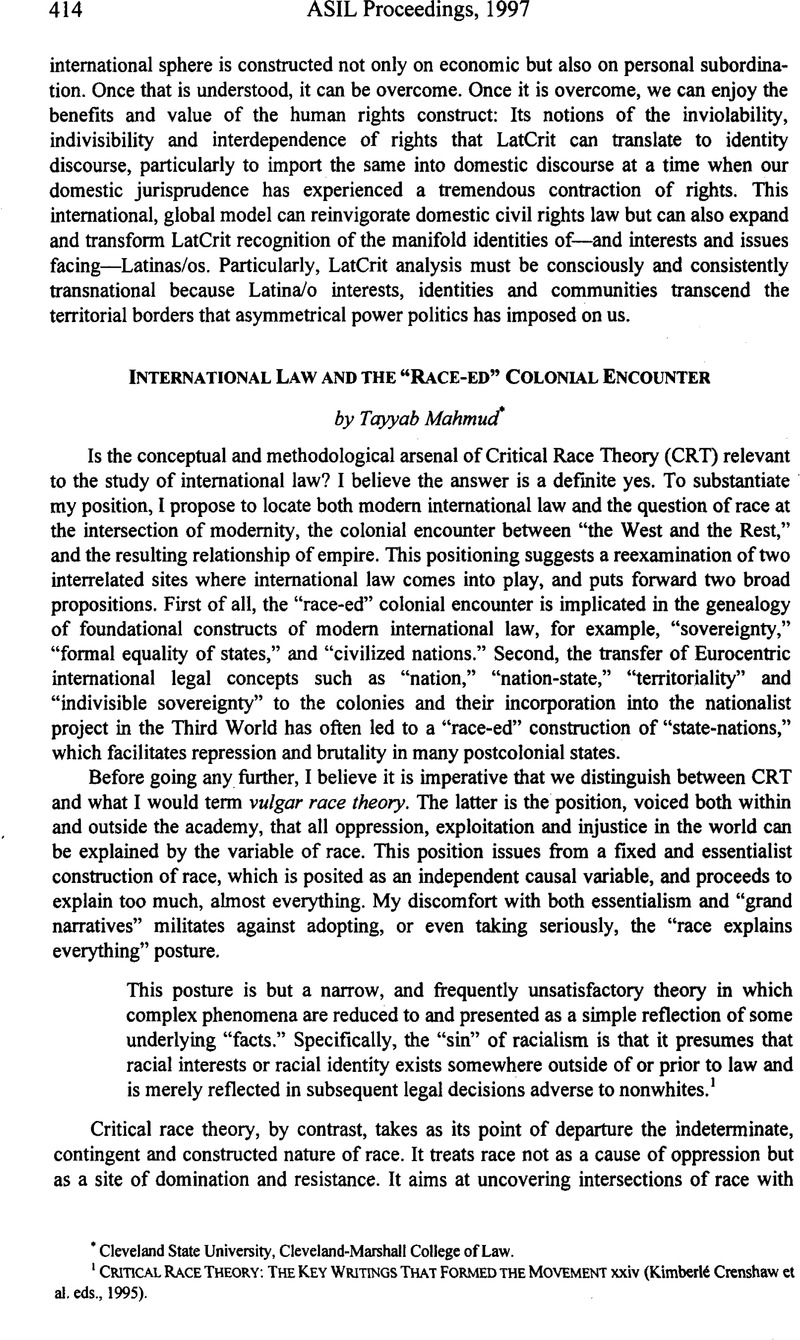Published online by Cambridge University Press: 28 February 2017

1 Critical Race Theory: The Key Writings that Formed the Movement xxiv (Kimberlé Crenshaw et al. eds., 1995).
2 Appadurai, Arjun, Patriotism and lts Future, 5 Pub. Culture 3, 411, 414 (1993)CrossRefGoogle Scholar.
3 David Campbell, Writing Security 113 (1992).
4 Camilleri, Joseph A., Rethinking Sovereignty in a Shrinking Fragmented World, in Contending Sovereignties: Redefining Political Community 38 (Walker, R.B.J. & Mendlovitz, Saul H. eds., 1990 Google Scholar).
5 Riles, Annelise, Aspiration and Control: International Legal Rhetoric and the Essentialization of Culture, 106 Harv. L. Rev. 723, 725 (1993)Google Scholar.
6 Id. at 733.
7 Id. at 731.
8 Id. at 730-31.
9 Id. at 737.
10 Id. at 735.
11 Anghie, Antony, Francisco de Vitoria and the Colonial Origins of International Law, 5 Social & Legal Stud. 321 (1996)CrossRefGoogle Scholar.
12 Id. at 322.
13 Id. at 332-33.
14 Id. at 332.
15 Mahmud, Tayyab, Migration, Identity and the Colonial Encounter, 76 Oregon L. Rev. (forthcoming 1998)Google Scholar.
16 Robert Miles, Capitalism and Labor Power: Anomaly Or Necessity 196-222 (1987).
17 S.G. Checkland, The Gladstones: A Family Biography, 1764-1851, at 318 (1971).
18 Gladstone, John, a Caribbean planter, quoted in Madhavi Kale, Projecting Identities: Empire and Indentured Labor Migration from India to Trinidad and British Guyana, 1836-1885, in Nation and Migration: The Politics of Space in the South Asian Diaspora 74-75 (van der Veer, Peter ed., 1995)Google Scholar.
19 Id. at 78.
20 See Race and the Enlightenment: A Reader (Emmanuel Chukwudi Eze ed., 1997).
21 Macaulay, Thomas Babington, Minute on Indian Education, in Selected Works 249 (Clive, John ed., 1972)Google Scholar.
22 Chatterjee, Partha, Nationalist Thought and the Colonial World: A Derivative Discourse? 10 (1993)Google Scholar.
23 Chatterjee, Partha, Whose Imagined Community?, 20(3) Millennium 521 (1991)CrossRefGoogle Scholar.
24 Benedict Anderson, Imagined Communities: Reflections on the Origins and Spread of Nationalism 80-108 (1983).
25 Mohammad Ayub Khan, Friends not Masters 187 (1967). Mohammad Ayub Khan was the praetorian dictator of Pakistan from 1958 to 1969.
26 Id.